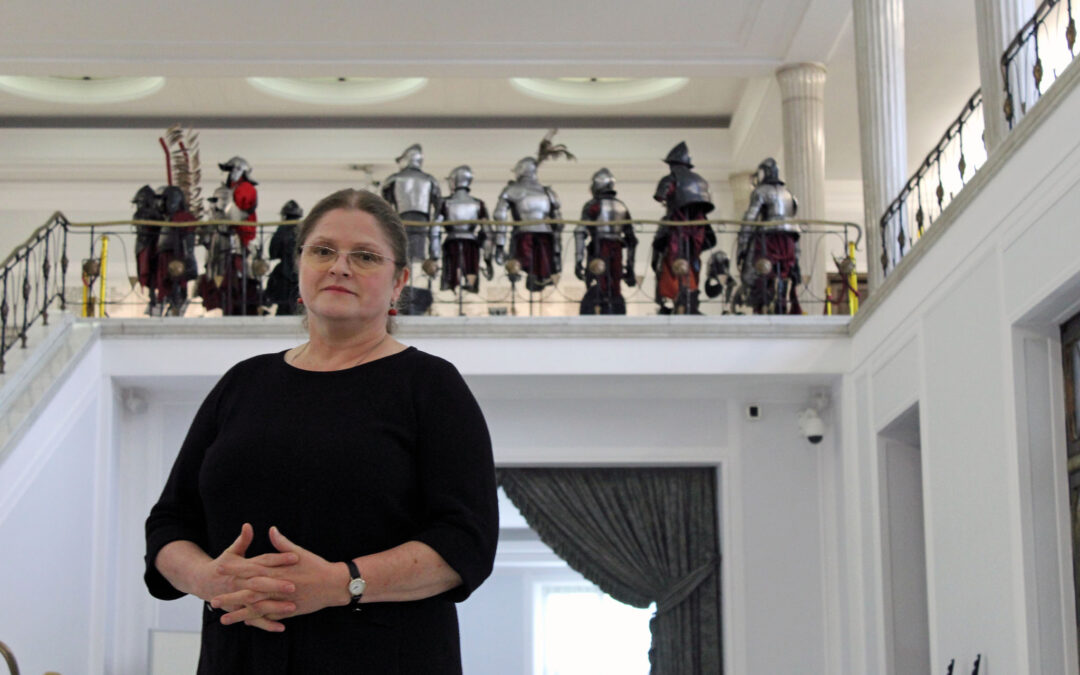A Polish constitutional court judge who published the personal details of a 10-year-old transgender child has been widely criticised, including by the mayor of the town where the pupil goes to school.
Krystyna Pawłowicz – who is one of 15 judges on Poland’s Constitutional Tribunal and previously served as an MP for the ruling national-conservative Law and Justice (PiS) party – broadcast the information in a post on Twitter, where she has over 60,000 followers.
In her tweet, Pawłowicz gave the name and address of a school in Podkowa Leśna – a town near Warsaw – and said that its principal had instructed teachers to address a 10-year-old pupil by her chosen female name, as requested by her parents. Pawłowicz also included the principal’s full name and the chosen name of the pupil, whom she referred to as a “boy”.
In response, the town’s mayor, Artur Tusiński, described the judge’s tweet as “disgusting” and as threatening “the welfare of our school and its principal”. He noted that, since Pawłowicz’s remarks yesterday, the school has already been subject to an inspection ordered by the local education superintendent, a government appointee.
“As a small community and with regard to the child’s welfare, we tried to avoid publicity,” wrote the mayor. “We are and will be open to the needs of every pupil, including transgender ones.”
“The basic condition for a person’s psychological wellbeing is the integration of their psyche and body, and the possibility to express themselves according to how they feel,” continued Tusiński. “The child has wise parents and understanding in the family.”
“It is the duty of adults to protect children, a fact that MP Pawłowicz seems to forget,” concluded the mayor. “We do not consent to the cynical use of children for political games.”
The judge’s remarks were also widely condemned on social media. Katarzyna Sadło, a conservative commentator who writes under the pseudonym Kataryna, called Pawłowicz a “sick, vile woman” and sarcastically congratulated PiS and President Andrzej Duda for appointing her to the court.
Campaign Against Homophobia (KPH), a leading Polish LGBT rights organisation, tweeted that “deadnaming” (using a trans or nonbinary person’s birth name rather than their chosen one) is a form of “violence”.
Beneath Pawłowicz’s tweet, however, many comments expressed anger at the school’s decision to respect the pupil’s chosen name. Another judge, Maciej Nawacki – president of the district court in Olsztyn and a member of the National Council of the Judiciary (KRS) – wrote that it could be overturned by the education superintendent.
Pawłowicz has long been a controversial figure. A professor of law, she previously served as a judge on Poland’s State Tribunal in 2007-11. However, it was as a PiS MP from 2011 until 2019 that she is best known, in particular for her outspoken remarks on social media.
She has said that Poland is in a “culture war” against the “Soros agenda, leftist moral pathologies”; condemned “fifth columnists without Polish genes”; called the LGBT community “sexually disturbed, sick people who should be treated”; and described the anniversary of Poland joining the European Union as a “sad day”.
Shortly after retiring as an MP in 2019 she was nominated by parliament – where PiS has a majority – to be a judge on the Constitutional Tribunal, the body entrusted with assessing and resolving disputes over the constitutionality of legislation and international agreements.
Issues of sexual and gender identity have become a battleground in Poland over recent years. PiS has led a vocal campaign against what it calls “LGBT ideology”, which it presents as a foreign threat that endangers Polish culture, identity and families, in particular children.
Last year, the then education minister defended an official who said that young people are threatened by an “LGBT virus” even more dangerous than COVID-19. The current education minister has linked “LGBT ideology” to Nazism and suggested that its adherents do not deserve the same rights as “normal people”.
In September, Poland’s commissioner for children’s rights – also chosen by the PiS parliamentary majority – warned that “LGBT ideology is being spread”. He said that it “is not good” and “is not in line with the traditional Polish understanding of patriotism”.
He also spoke out against sex educators at schools, implying that they target “unstable” children and push them to take sex-change drugs without the knowledge or consent of parents and teachers. He claimed one such case had occurred in Poznań, but local authorities in the city said that there was no such incident.
Main image credit: Lukas Plewnia/Flickr (under CC BY-SA 2.0)

Daniel Tilles is editor-in-chief of Notes from Poland. He has written on Polish affairs for a wide range of publications, including Foreign Policy, POLITICO Europe, EUobserver and Dziennik Gazeta Prawna.




















